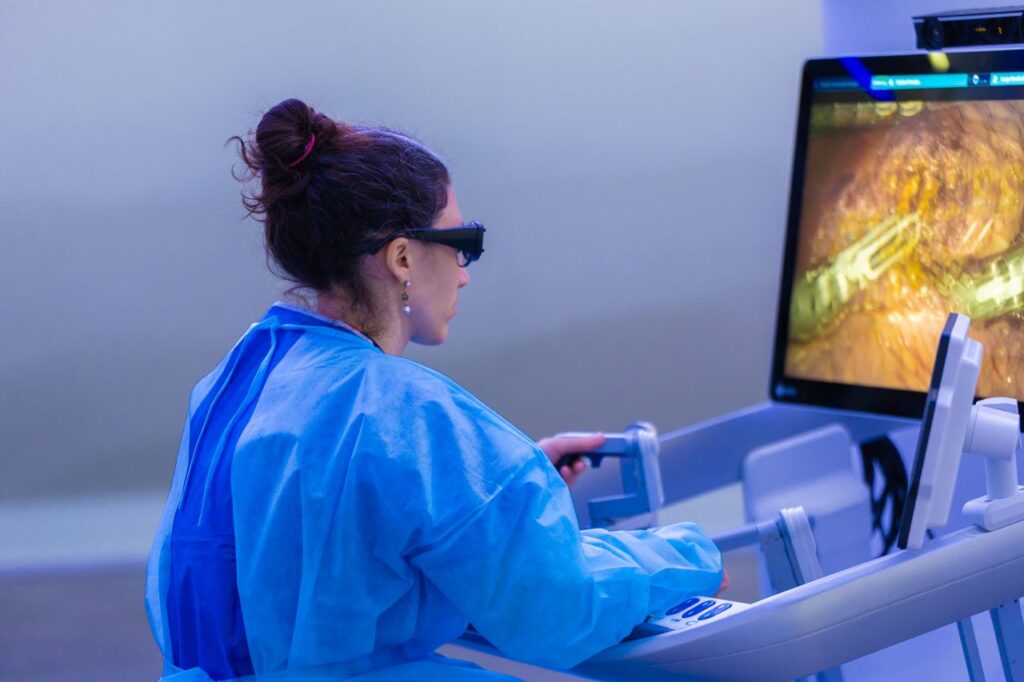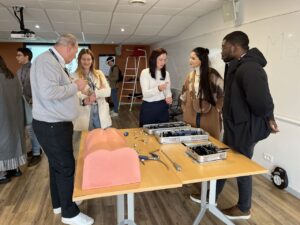Digital transformation of medical devices: towards a global solution for health


Medical devices are omnipresent in our healthcare system, whether they are dressings, implants or mobility equipment such as wheelchairs. Historically used in an autonomous manner, they are now at the center of a profound digital transformation, facilitated by the rise of artificial intelligence technologies and connected devices. This development allows for the complete integration of medical devices into global solutions that cover the entire care pathway, from prevention to post-treatment follow-up.
Céline Dujardin explains that this transition marks a fundamental change for healthcare manufacturers and hospitals. “We are moving from isolated devices to integrated and connected systems, capable of forming part of a global approach that optimizes the diagnosis, monitoring and management of patients,” she emphasizes. This shift towards ‘smart’ devices improves the accuracy of diagnoses and the quality of care, while helping to lighten the workload of healthcare professionals.

Workshop at the AJCR Spine Camp, March 22-24, 2024: young surgeons discovering Medtronic technologies, from robotics to virtual reality.
Artificial intelligence is revolutionizing several aspects of the care pathway, enabling increased standardization, time savings for medical staff, and optimization of resources. Innovations based on AI also enable more precise personalization of care, adapted to the particularities of each patient.
Medical devices using AI are showing promising results: recent tests on an AI-equipped endoscope, for example, have demonstrated a reduction of nearly 50% in missed adenomas during colonoscopies, limiting the subsequent risk of cancer development for patients. “This is a significant step forward for the early detection and treatment of diseases, thanks to more accurate diagnoses and better targeted care,” adds Céline Dujardin. Once fully integrated, these technologies pave the way for comprehensive healthcare solutions that combine efficiency and personalization.
The digital transformation of medical devices, while promising, comes with many challenges. The current regulatory framework imposes strict standards for the approval of medical devices. The AI Act, the European regulation on artificial intelligence, sets new requirements for the use of AI in healthcare, adding additional steps to ensure the safety and efficacy of these devices.
The financing of digital medical devices is also an obstacle. In France, innovative digital devices do not always receive adequate public funding, which slows down their large-scale adoption. This challenge highlights the importance of integrating digital health technologies into the French healthcare system in order to maximize their impact on care.
Finally, cybersecurity is crucial for connected devices, which are particularly vulnerable to cyberattacks. The protection of sensitive data and the security of medical devices are priorities for manufacturers and decision-makers. “The security of patient data is a fundamental issue. It is imperative to be able to anticipate and counter these threats to guarantee the integrity of medical devices and the confidentiality of personal information,” insists Céline Dujardin.

Céline Dujardin at the 45th anniversary of Medtronic
For decision-makers, the example of the integration of medical devices into global solutions offers concrete perspectives on the role of digital technologies in healthcare. The ITN, through initiatives such as the ITN Digital Health seminar, shows that Mines Paris – PSL is establishing itself as a leading player in digital innovation and the search for disruptive solutions to healthcare challenges. With coordinated strategies between research, technological innovation and regulation, it is becoming possible to make digital technology a real response to public health issues.
This model, from technology to global solution, represents enormous potential for optimizing care, reducing costs and improving the quality of life for patients.
Created in March 2024, the ITN of Mines Paris – PSL is positioning itself as a central player in the digital transition, mobilizing the expertise of its 18 research centers. With strategic focuses such as digital health, digital engineering and cultural industries, the ITN brings together knowledge to meet the economic, social and technological challenges of our time. Driven by a responsible and collaborative approach, it aims to accelerate innovation and guide public and private actors in this transformation.
The Digital Health seminar brought together researchers, industrialists and decision-makers to discuss the major issues surrounding the digitization of healthcare. In a world where technological advances are redefining medical practices, digital health is emerging as a lever for responding to the current and future challenges of the healthcare system. The ITN is exploring these transformations through various themes: the reinvention of hospital infrastructures, the development of digital twins for precision medicine and the integration of artificial intelligence at all levels of healthcare. These issues are not limited to technological innovation; they also question the social, economic and ethical dimensions of connected and intelligent medicine, paving the way for more personalized, accessible and predictive care.

La transformation numérique dans les hôpitaux dépasse la simple innovation technique et nécessite une réorganisation profonde des structures et des pr...